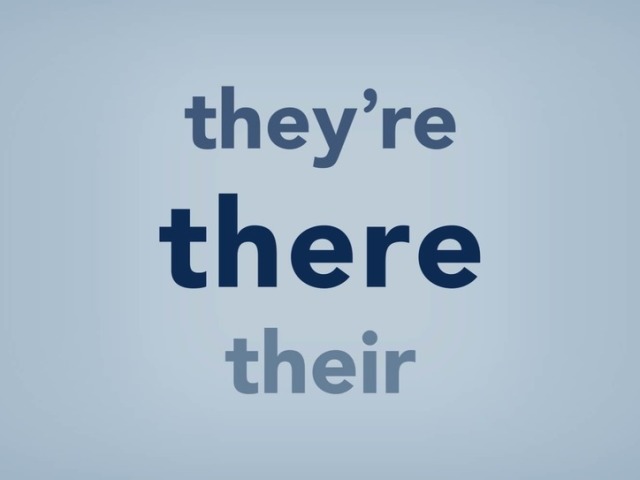

It's pointing toward a place or position, indicating direction. Did you know their new business has taken off?.Their car goes way faster than your car does.You should stop by their lemonade stand for a drink.I never forgot that it was their suggestion that started the company.Why don't you ask them what their plans are?.Joe and Sue always want things their way.Reviewing some examples of "their" in a sentence should help you get its usage right. Instead of saying, "That's the Murphy family's new dog," you can say, "That's their new dog." While "his" and "her" demonstrate singular possession (possession by one person), "their" is reserved for two or more people or things. More specifically, "their" is a possessive pronoun. It always indicates possession by people or things. There, there, you'll get them next time."Their" is pretty straightforward.That tree there is where the car crashed.Ĭomo interjección (exclamación), "there" puede expresar una variedad de sentimientos y emociones, desde alivio y satisfacción hasta aprobación, apoyo y consolación.(sustituye un nombre para un tiempo específico.) There won't be another chance as good as this one.También puede sustituir un nombre de lugar o un nombre que define un tiempo en específico. After we set the bones, from there you start your recovery.Ĭomo pronombre, "there" sustituye un nombre cuando el verbo viene antes del sujeto o no se menciona el sujeto.Once you get into college, you have to face it alone from there on.(se refiere a a un asunto o evento en específico)Ĭomo nombre, "there" se refiere a estado o condición: I was right to feel sad while I was there.(se refiere a "dentro de o en ese lugar"). También puede llamar la atención a un punto en especial. "There" tiene funciones múltiples y ouede ser usado como adverbio, nombre, pronombre, adjetivo o interjección (exclamación).Ĭomo adverbio (modificador de verbo) "there" se puede referir a "dentro de o en ese lugar," un momento en el tiempo, un punto específico en un proceso on un asunto en particular. Someone parked his or her car in a towing zone.Does every one have their ticket in hand? (Géneros mixtos.)Įste uso de "their" es común en conversaciones y en inglés informal escrito, pero en escritos profesionales o académicos, dependiendo de las guías de estilo, se prefiere el uso de "his or her" en vez de "their":.Some one parked their car in a towing zone."Their" es la forma posesiva del pronombre plural they, usado como adjetivo antes de un nombre ( their house, their books, their lunch order yesterday).Ī pesar de ser plural, en inglés their ha llegado a ser usado de forma común como un reemplazo de los pronombres posesivos singulares his y her, como antecedente indefinido (donde el género de la persona no se conoce o es un grupo mixto, como sucede en español cuando se usa "ellos" o "todos" para referirse a un grupo que incluye hombres y mujeres.)

Para más ejemplos, vea el siguiente video, donde se explica la diferencia entre their, there y they're (que sigifica ellos/ellas son): Once upon a time, there was a princess who turned into a frog.Their van was destroyed in the accident.I don't want to go there because it's too cold.


 0 kommentar(er)
0 kommentar(er)
